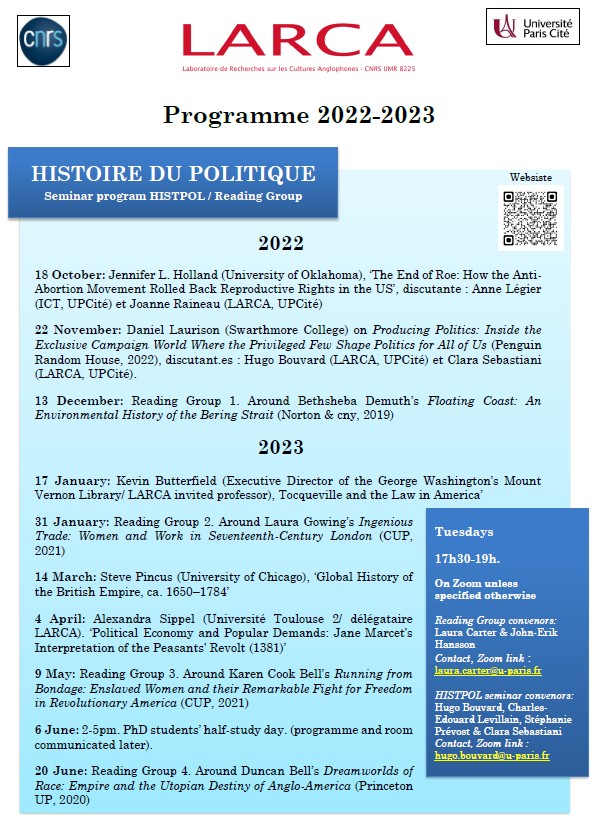30 mai 2023 - 17 h 30 min - 19 h 00 min
This paper proposes to examine the passages in which Jane Marcet (1769-1858) alludes to fourteenth-century revolts in order to question the debates of her days on wages and prices. The second half of the fourteenth century offers her the perfect case study to promote the Malthusian economics she upheld in her two main textbooks (Conversations on Political Economy, intended for young upper-class ladies, and John Hopkins’s Notions of Political Economy, destined to the literate working man). The plague epidemics that culled the British (and indeed European) population in 1348-1349 took a particular toll on the poorest, notably peasants. When they demanded increases in their wages, King Edward III and his Parliament adopted the Statute of Labourers (1351) that forbade to increase wages beyond what they had been in 1346, prior to the epidemics, thus, according to Marcet, violating the law of free markets according to which labour should be more expensive when the workforce is smaller than when it is more plentiful. John Hopkins discusses the post-plague events with his wife in a conversation that shows that he has accepted the natural laws of economics as promoted by Jane Marcet and her friends of the Political Economy Club in the first half of the nineteenth century. Somehow though, he is made to vindicate the revolts that occurred after the King tried to unnaturally cap wages:
“But the book went on to say, that when the King who reigned in those times heard that his subjects would not work without higher wages, he fell into a rage, and made a law such as you were thinking of, wife, to forbid under severe pains and penalties, that the poor should take higher wages than they had before the plague.” — “Why, then I think he was no better than a tyrant, to hinder the poor from getting what they fairly could: he must have been quite another sort of man from our good King William.” — “That he was,” said John; “but it would not do; and after a hard struggle, the king was obliged to give in, and the people got the wages they asked.”
Yet, what John remembers from the book he was told about by his child’s schoolmaster is historically wrong: the Statute of Labourers was implemented, and popular protests only arose three decades later in 1381 when Edward III’s successor, young King Henry II, imposed a new poll tax on all above the age of 15, kindling the rebellion that became known as the Peasants’ Revolt.
So this paper proposes to examine the reasons why the events described in the history book John mentions are likely to conflate all popular unrest that followed the 1349 epidemic, and, more importantly, to see how Jane Marcet (who also wrote history textbooks) bends historical facts in order to convince nineteenth-century workers who were tempted by radical protests for higher wages, that reason actually commanded other ways to reach that objective – the ways of Malthusian economics.
Alexandra Sippel – Maîtresse de conférences, département d’anglais, Université Toulouse-Jean Jaurès

Programme Séminaire HISTPOL_reading group 2022-2023
Séminaire Histoire du politique
Le séminaire de l’axe histoire du politique du LARCA se réunit plusieurs fois par an pour aborder différents aspects de la culture et de la politique des pays anglophones dans une perspective de longue durée historique (17e-21e siècles).
Le nom « Histoire du politique » n’est en rien limitatif ; il s’agit au contraire de multiplier les approches pour échapper à une interprétation unique du politique et utiliser l’histoire sociale, culturelle et intellectuelle pour s’interroger sur ce qui constitue les identités politiques et sur les liens entre la politique et la vie quotidienne.
Le séminaire reflète les cinq thématiques principales qui ressemblent les historiens et politistes travaillant au sein de l’axe “Histoire du Politique” du LARCA:
- Politiques internationales et réseaux diplomatiques dans les mondes anglophones
- Migrations, Discriminations, Inégalités raciales et ethniques
- Construction des identités nationales et des mythes nationaux
- Démocratie, démocratisation et politisation en Amérique du Nord et au Royaume-Uni.
- L’espace atlantique et la première mondialisation, 1600-1850
***
Début 2021, l’axe Histoire du politique met en place un « reading group ». Coordonné par Laura Carter, il constitue un moment d’échange autour de publications récentes dans le domaine des études historiques sur les mondes anglophones des 19-21e siècles. Il s’agit à chaque séance d’engager une discussion approfondie sur un ou deux ouvrages.
Coordonné par :
Stéphanie Prévost et Daniel Foliard


